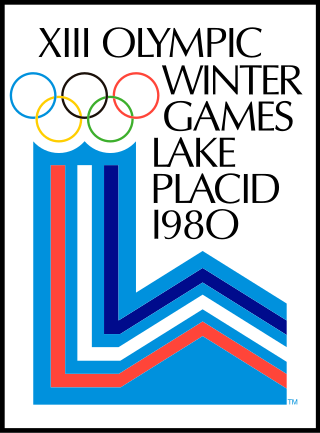
The 2002 Winter Olympics, officially the XIX Olympic Winter Games and commonly known as Salt Lake 2002, were an international winter multi-sport event that was held from February 8 to 24, 2002, in and around Salt Lake City, Utah, United States.

The 1980 Winter Olympics, officially the XIII Olympic Winter Games and also known as Lake Placid 1980, were an international multi-sport event held from February 13 to 24, 1980, in Lake Placid, New York, United States.

The 1976 Winter Olympics, officially known as the XII Olympic Winter Games and commonly known as Innsbruck 1976, were a winter multi-sport event celebrated in Innsbruck, Austria, from February 4 to 15, 1976. The games were awarded to Innsbruck after Denver, the original host city, withdrew in 1972. This was the second time the Tyrolean capital had hosted the Winter Olympics, having first done so in 1964.

Hughes Air Corporation, doing business as Hughes Airwest, was a local service carrier from 1970 to 1980 in Western United States. It was backed by Howard Hughes' Summa Corporation. Its original name in 1968 was Air West and the air carrier was owned by Nick Bez. Hughes Airwest flew routes in the western U.S. and to several destinations in Mexico and Canada; its headquarters were on the grounds of San Francisco International Airport (SFO) in unincorporated San Mateo County, California.

National Olympic Committees that wish to host an Olympic Games select cities within their territories to put forth bids for the Olympic Games. The staging of the Paralympic Games is automatically included in the bid. Since the creation of the International Olympic Committee (IOC) in 1894, which successfully appropriated the name of the Ancient Greek Olympics to create a modern sporting event, interested cities have rivaled for selection as host of the Summer or Winter Olympic Games. 51 different cities have been chosen to host the modern Olympics: three in Eastern Europe, five in East Asia, one in South America, three in Oceania, nine in North America and all the others in Western Europe. No Central American, African, Central Asian, Middle Eastern, South Asian, or Southeast Asian city has ever been chosen to host an Olympics.

Loveland Ski Area is a ski area in the western United States, located near the town of Georgetown, Colorado. Located at the eastern portal of the Eisenhower Tunnel, Loveland is within the Arapahoe National Forest. It is one of the closest ski areas to the Denver metropolitan area and Front Range corridor, making it popular with locals.
William Eugene "Bud" Davis was an American university president, Democratic politician, and football coach. He was an interim head football coach for the Colorado Buffaloes for the 1962 season. He was later the President of Idaho State University and the University of New Mexico, and Chancellor of the Oregon University System and Louisiana State University.
Peter Werner Seibert was an American skier and the founder of Vail Ski Resort in Colorado. He was inducted into the Colorado Ski Hall of Fame in 1980.

For the 1976 Winter Olympics in Innsbruck, Austria, a total of eight sports venues were used. The games were originally awarded to Denver, Colorado in the United States in 1970, but they withdrew in the wake of Colorado residents voting against it for environmental and cost reasons in November 1972. This led to the International Olympic Committee opening up the bids for the games again, eventually awarding them to Innsbruck in February 1973. The Austrian city, having hosted the Winter Olympics in 1964, was in the process of having the venues used for those Games before Denver's with clear cutting of the alpine skiing venues, lessening of the amount of cross-country skiing routes, upgrading the ski jumps, adding lighting in the indoor sports arena to accommodate color television, and the construction of a combination bobsleigh and luge track. After the 1976 Games, the venues have remained in use, hosting events in Nordic skiing and the sliding sports. They hosted some of the events for the Winter Universiade in 2005 and seven of the eight venues served as host for the first Winter Youth Olympic Games in 2012.
The 1961 Montana Grizzlies football team represented the University of Montana in the 1961 NCAA University Division football season as a member of the Skyline Conference (Skyline). The Grizzlies were led by fourth-year head coach Ray Jenkins, played their home games at Dornblaser Field and finished the season with a record of two wins and six losses.

Mount Sniktau is a high mountain summit in the Front Range of the Rocky Mountains of North America. The 13,240-foot (4,036 m) thirteener is located in Arapaho National Forest, 1.6 miles (2.5 km) northeast of Loveland Pass in Clear Creek County, Colorado, United States.

The Denver Winter Olympics Referendum was held in 1972 following the awarding to Denver of the 1976 Winter Olympics.
The 1973 Boise State Broncos football team represented Boise State College during the 1973 NCAA Division II football season, the sixth season of Bronco football and the first in the newly reorganized Division II. The Broncos were in their fourth year as members of the Big Sky Conference and played their home games on campus at Bronco Stadium in Boise, Idaho.
The 1972 Idaho Vandals football team represented the University of Idaho in the 1972 NCAA University Division football season. The Vandals were led by third-year head coach Don Robbins and were members of the Big Sky Conference. They played their home games at new Idaho Stadium, an unlit outdoor facility on campus in Moscow, Idaho.

The 1961 NCAA Skiing Championships were contested at the Middlebury College Snow Bowl in Hancock, Vermont at the eighth annual NCAA-sanctioned ski tournament to determine the individual and team national champions of men's collegiate alpine skiing, cross-country skiing, and ski jumping in the United States.
The 1971 Boise State Broncos football team represented Boise State College during the 1971 NCAA College Division football season, the fourth season of Bronco football and the second as members of the Big Sky Conference and NCAA. In the College Division, they played their home games on campus at Bronco Stadium in Boise, Idaho.
The 1967 Idaho Vandals football team represented the University of Idaho in the 1967 NCAA College Division football season. The Vandals were led by third-year head coach Steve Musseau and played a third season in the Big Sky Conference. Two home games were played on campus at Neale Stadium in Moscow, with another in Boise at old Bronco Stadium at Boise Junior College. The Vandals were 4–6 and were outscored 332 to 156.
The 1975–76 Idaho State Bengals men's basketball team represented Idaho State University during the 1975–76 NCAA Division I men's basketball season.
The 1972–73 Boise State Broncos men's basketball team represented Boise State College during the 1972–73 NCAA University Division basketball season. The Broncos were led by eighth-year head coach Murray Satterfield, and played their home games on campus at Bronco Gymnasium in Boise, Idaho.











